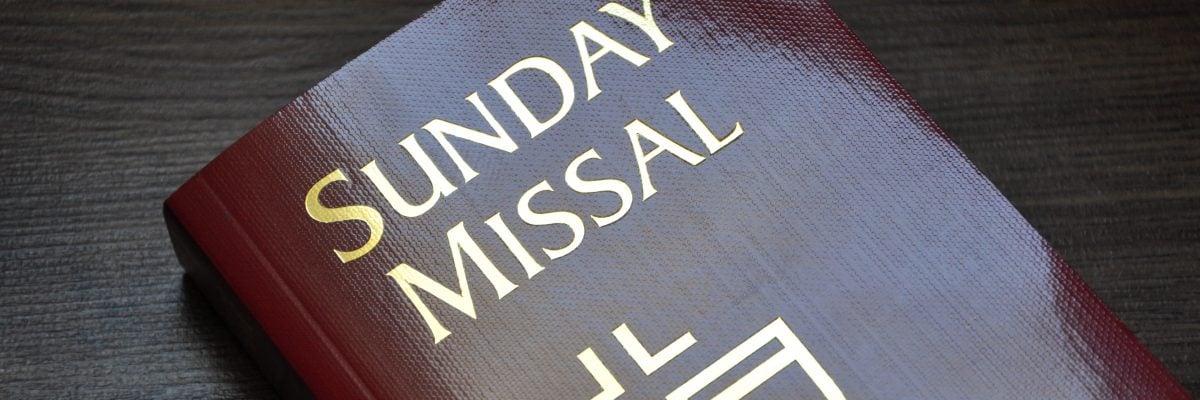
I have encountered many “non-denominational” Christians who believe that going to church on Sunday is a good thing, but not absolutely necessary. What’s really important according to them is that you develop a “personal relationship” with Jesus.
In my experience, most people who say this are generally well-meaning, but they inadvertently discourage other Christians from going to church by taking this position.
Often they are surprised when they hear for the first time that Catholics are obligated to go to mass every Sunday. From our perspective, public worship is as intimate a relationship as one can have with Jesus while here on earth.
People making excuses to avoid Sunday worship is nothing new. Even in the first century this was a problem:
Let us not give up meeting together, as some are in the habit of doing, but let us encourage one another—and all the more as you see the Day approaching (Heb. 10:25).
The author of the letter to the Hebrews is asking his readers not to give up on gathering for public worship.
But why was this public gathering so important to the early Christians? What did they do there that could not be done privately?
According to the Bible, Christians gathered to partake in the “breaking of the bread” (Acts 2:42, 2:46, 20:17) on the first day of the week, the “Lord’s Day” (Acts 20:7, 1 Cor. 16:2). Sunday is the first day of the week, and also referred to by early Christian sources as “The Lord’s Day” because it is the day that Christ rose from the dead.
Early Christian writings can be helpful in understanding what is written in the Bible. For instance, the Didache, a first-century Christian instruction manual, explains:
But every Lord’s Day [Sunday] gather yourselves together and break bread, and give thanksgiving after having confessed your transgressions, that your sacrifice may be pure. But let no one that is at variance with his fellow come together with you, until they are reconciled, that your sacrifice may not be profaned (Didache 14).
The early Christians gathered every Sunday, not on random Sundays or whenever it was convenient.
The Didache refers to the breaking of bread as a “sacrifice.” To understand why this document would refer to the breaking of bread in public this way, we need to go back to the Bible and read the words of St. Paul:
For I received from the Lord that which I also delivered to you, that the Lord Jesus in the night in which He was betrayed took bread; and when He had given thanks, He broke it and said, “This is My body, which is for you; do this in remembrance of Me.” In the same way He took the cup also after supper, saying, “This cup is the new covenant in My blood; do this, as often as you drink it, in remembrance of Me.” For as often as you eat this bread and drink the cup, you proclaim the Lord’s death until He comes.
Therefore whoever eats the bread or drinks the cup of the Lord in an unworthy manner, shall be guilty of the body and the blood of the Lord. But a man must examine himself, and in so doing he is to eat of the bread and drink of the cup. For he who eats and drinks, eats and drinks judgment to himself if he does not judge the body rightly. For this reason many among you are weak and sick, and a number sleep. But if we judged ourselves rightly, we would not be judged. But when we are judged, we are disciplined by the Lord so that we will not be condemned along with the world. So then, my brethren, when you come together to eat, wait for one another (1 Cor. 11:23-33).
Here St. Paul equates the bread and the cup to the body and blood of Jesus. He then repeats what Jesus said to the disciples at the Last Supper, when Jesus proclaimed the bread and wine to be his body and blood and commanded that the apostles do this in his memory.
Jesus foreshadows his command in John 6 when he explained to the disciples that he was the “bread from heaven” and they must “eat his flesh and drink his blood” (John 6:35-58). Some Christians claim this teaching is merely symbolic, but that leaves unexplained verse 51 which says “Whoever eats this bread will live forever. This bread is my flesh, which I will give for the life of the world.”
St. Paul warns the Corinthians against partaking of the bread and the cup in an unworthy manner because it is literally our participation in that “once for all” sacrifice of Jesus Christ on the cross. This was the universal Christian understanding of the Eucharist from the time of the apostles until the Protestant Reformation.
This does not mean there is no place for private devotions and prayer. Those are biblical concepts, too. The “breaking of the bread” though was not meant to be done in private, and the practice was mandated by Christ at the Last Supper when he consecrated the bread and wine, teaching his apostles how to worship.
Blessed John Paul II sums up nicely the importance of Sunday worship for Catholics:
Sunday is a day which is at the very heart of the Christian life. From the beginning of my Pontificate, I have not ceased to repeat: “Do not be afraid! Open, open wide the doors to Christ!” In the same way, today I would strongly urge everyone to rediscover Sunday: Do not be afraid to give your time to Christ! Yes, let us open our time to Christ, that he may cast light upon it and give it direction. He is the One who knows the secret of time and the secret of eternity, and he gives us “his day” as an ever new gift of his love. The rediscovery of this day is a grace which we must implore, not only so that we may live the demands of faith to the full, but also so that we may respond concretely to the deepest human yearnings. Time given to Christ is never time lost, but is rather time gained, so that our relationships and indeed our whole life may become more profoundly human (Dies Domini 9).



